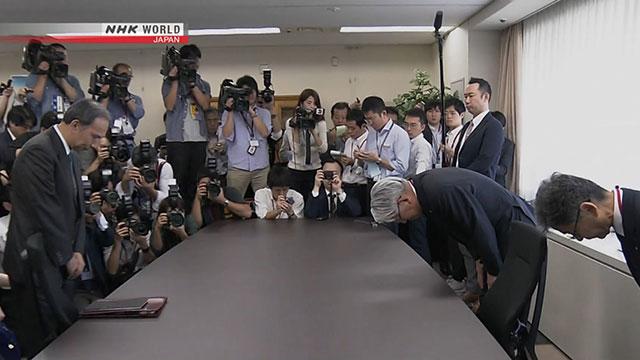Officials at the Industry Ministry view the data fabrication scandal as something that affects trust in the entire country's manufacturing industry.
They gave Kobe Steel one month to investigate the cause and draw up preventive measures to deal with the situation.
On October 12th, Kobe Steel's President and CEO Hiroya Kawasaki visited the Industry Ministry to apologize. He also gave an update on the progress of an in-house investigation.
Kawasaki said, "We are sorry for causing worry for many people. We will thoroughly analyze the cause of the problem, and draw up measures to prevent any recurrence."
He added that his firm has prioritized checking the safety of products that have already been shipped.
Industry Ministry officials have told Kawasaki to announce the results of the company's product-safety checks in about two weeks.
Company officials have admitted they shipped aluminum, copper and steel powder products with falsified inspection certificates, including items manufactured by a subsidiary.
The head of Kobe Steel told reporters he cannot deny the possibility that more instances will come to light. He said officials are investigating suspected cases inside and outside of Japan.
The company announced its misconduct on October 8th at a news conference in Tokyo.
The products are mainly used to make automobile and aircraft parts. Kobe Steel officials say they were delivered to about 200 firms.
The products were shipped through August this year. Officials say workers altered data on the strength of the materials.
The size and shape of some of the items did not match the requirements in the orders. But the company said no problems were found in the inspections. In some cases, they were checked only once, even though multiple inspections were required.
The company says it has confirmed that the falsification took place at 4 plants in Japan, including a Kobe Steel subsidiary. They say the problem affects 19,300 tons of aluminum and 2,200 tons of copper products, or about 4 percent of the firm's annual output of the items.
The company set up an investigative team, which says the falsification began at least 10 years ago.
In June of last year, one of Kobe Steel's group companies admitted faking the data for some stainless-steel products to meet the Japanese Industrial Standards, or JIS.
The scandal comes amid the firm's new strategy
Kobe Steel is the third-largest steel maker in Japan, after Nippon Steel & Sumitomo Metal and JFE Holdings. It posted sales of about 15 billion dollars last fiscal year.
Japanese steel manufacturers had been struggling in the face of over-production in China and global price declines. But this year, business began to improve.
Steel producers are developing lighter, stronger materials for electric vehicles. Last month, Kobe Steel said it will invest in a US plant to increase production of ultra-high strength steel by 60%.
The fake-data scandal comes amid this new strategy.
Naoto Umehara, a vice president of Kobe Steel, told reporters "We altered data to falsely show the products met customer specifications. This involved not only plant workers, but also those in management positions."
Business leaders have expressed deep concern.
Sadayuki Sakakibara, a Chairman of the Japan Business Federation, told reporters on October 10th, "Japanese manufacturers have won global trust for the much higher quality they offer compared with other countries. This incident poses a serious problem."
Companies across Japan are now wondering about the safety of their products
On October 11th, in-house investigators at Kobe Steel found that staff had altered data on at least one steel-powder product in addition to other falsifications.
Steel powder is used to make automobiles and home electronics products.
Kobe Steel says it has already delivered the products to one client. Officials say they are checking whether it poses a safety problem.
The scandal has hit a variety of industries.
Japanese electronics maker Hitachi has said it used products from Kobe Steel in railway carriages it made for British high-speed trains.
Hitachi received orders for 866 carriages. It manufactures them at a plant in northern England. Hitachi officials say they do not know how many carriages were made with the substandard steel.
But they say checks have been conducted on materials used in making carriages and that no problems have been found.
Mitsubishi Heavy Industries is another example. The maker of the H2A rocket that was launched on October 10th revealed that the rocket included materials made by the scandal-hit steelmaker.
Officials at Mitsubishi Heavy Industries say their in-house inspections confirmed that the materials are safe and that their latest rocket did not experience any technical problems.
Toyota, Nissan and other automakers also say they have used the products in their vehicles.
West Japan Railway Company has disclosed that they used Kobe Steel's aluminum products on Shinkansen bullet trains.
The firm's president, Tatsuo Kijima, says the products are used on about 150 parts. This includes those used to turn the wheels of carriages.
Kijima says there are no safety concerns because the company allows for ample leeway in terms of structural integrity. The railway plans to replace the parts during regular inspections.
Kijima says the company operates its trains expecting that products delivered to it are safe. He says that as a firm that passengers depend on for safety, it is extremely regrettable that faulty products were used.
Central and East Japan Railway Companies also say they used the products in bullet train cars. Kyushu Railway Company used the products in 12 conventional train carriages.
Kawasaki Heavy Industries and Subaru revealed that the problematic products may have been used in fuselages for US aircraft maker Boeing.
A subsidiary of Mitsubishi Heavy Industries has used some of the metals for the MRJ regional passenger jet it is developing.
All of these companies say that so far, the products have shown no signs of safety or durability issues.
